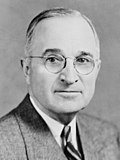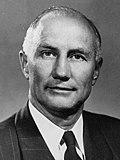| |||||||||||||||||||||||||||||||||
All 14 North Carolina votes to the Electoral College | |||||||||||||||||||||||||||||||||
|---|---|---|---|---|---|---|---|---|---|---|---|---|---|---|---|---|---|---|---|---|---|---|---|---|---|---|---|---|---|---|---|---|---|
| |||||||||||||||||||||||||||||||||
 County results
| |||||||||||||||||||||||||||||||||
| |||||||||||||||||||||||||||||||||
| Elections in North Carolina |
|---|
 |
The 1948 United States presidential election in North Carolina took place on November 2, 1948, as part of the 1948 United States presidential election. North Carolina voters chose 14[2] representatives, or electors, to the Electoral College, who voted for president and vice president.
As a former Confederate state, North Carolina had a history of Jim Crow laws, disfranchisement of its African-American population and dominance of the Democratic Party in state politics. However, unlike the Deep South, the Republican Party had sufficient historic Unionist white support from the mountains and northwestern Piedmont to gain one-third of the statewide vote total in most general elections,[3] where turnout was higher than elsewhere in the former Confederacy due substantially to the state’s early abolition of the poll tax in 1920.[4] Like Virginia, Tennessee and Oklahoma, the relative strength of Republican opposition meant that North Carolina did not have statewide white primaries, although certain counties did use the white primary.[5] Consequently, local response to the landmark 1944 court case of Smith v. Allwright was generally calm.[5]
Nevertheless, the state was highly dissatisfied with the influence of blacks and labor unions on the national Democratic Party, and was initially satisfied when liberal Vice-President Henry A. Wallace was replaced on the Democratic ticket in 1944.[6] However, by the beginning of 1946 most white North Carolinians were disapproving of President Truman, primarily because he appointed the first black federal judge and made overtures – though symbolic – toward civil rights.[6] When Truman actually developed a proposal for black civil rights titled To Secure These Rights, however, North Carolina was the only Southern state where there was relatively little overt anger, and the state provided the only three votes from the former Confederacy for Truman as Democratic nominee during the party’s 1948 National Convention. Combined with the persistent local Republican threat from mountain Unionist descendants, this meant that there was never any question of the state Democratic Party supporting South Carolina Governor Strom Thurmond.
9% of white voters supported Thurmond.[7]
- ^ "United States Presidential election of 1948 – Encyclopædia Britannica". Retrieved October 31, 2017.
- ^ "1948 Election for the Forty-First Term (1949-53)". Retrieved October 31, 2017.
- ^ Phillips, Kevin P.; The Emerging Republican Majority, pp. 210, 242 ISBN 978-0-691-16324-6
- ^ Key, Valdimer Orlando; Southern Politics in State and Nation, p. 502, Alfred A. Knopf (1949)
- ^ a b Klarman, Michael J. (2001). "The White Primary Rulings: A Case Study in the Consequences of Supreme Court Decision-Making". Florida State University Law Review. 29: 55–107.
- ^ a b Grayson, A.G. (December 1975). "North Carolina and Harry Truman, 1944-1948". Journal of American Studies. 9 (3): 283–300. doi:10.1017/S0021875800003005.
- ^ Black & Black 1992, p. 147.


